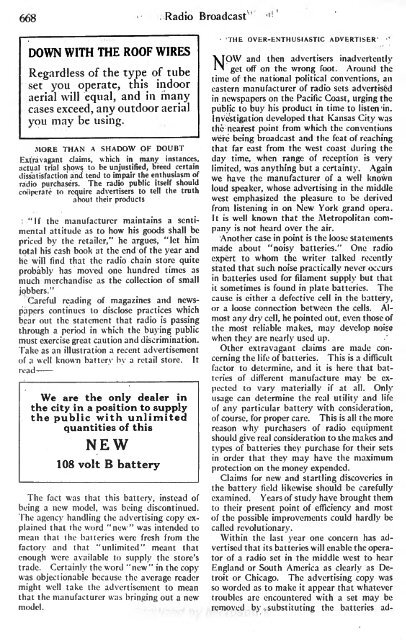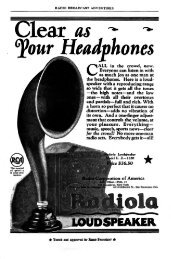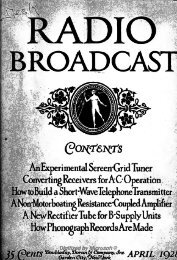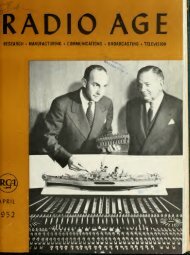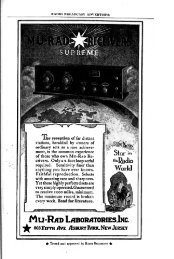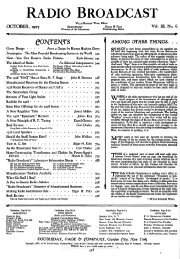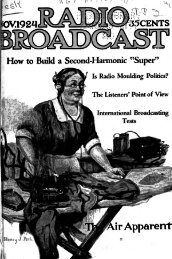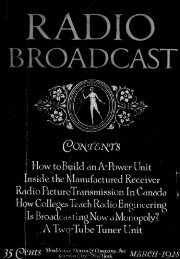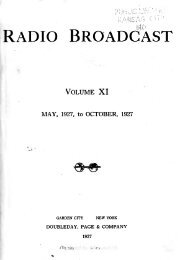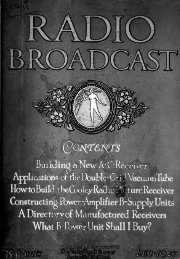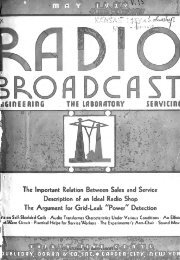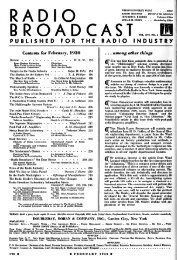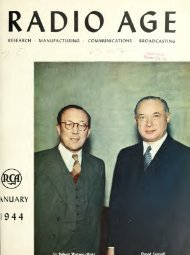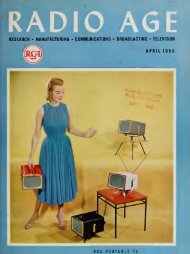Radio Broadcast - 1925, February - 113 Pages ... - VacuumTubeEra
Radio Broadcast - 1925, February - 113 Pages ... - VacuumTubeEra
Radio Broadcast - 1925, February - 113 Pages ... - VacuumTubeEra
Create successful ePaper yourself
Turn your PDF publications into a flip-book with our unique Google optimized e-Paper software.
: "If<br />
668 <strong>Radio</strong> <strong>Broadcast</strong><br />
DOWN WITH THE ROOF WIRES<br />
Regardless of the type of tube<br />
set you operate, this indoor<br />
aerial will equal, and in many<br />
cases exceed, any outdoor aerial<br />
you may be using.<br />
MORE THAN A<br />
SHADOW OF DOUBT<br />
Kxtravagant claims, which in many instances,<br />
actual trial shows to be unjustified, breed certain<br />
dissatisfaction and tend to impair the enthusiasm of<br />
radio purchasers. The radio public itself should<br />
cooperate to require advertisers to tell the truth<br />
about their products<br />
the manufacturer maintains a sentimental<br />
attitude as to how his goods shall be<br />
priced by the retailer," he argues, "let him<br />
total his cash book at the end of the year and<br />
he will find that the radio chain store quite<br />
probably has moved one hundred times as<br />
much merchandise as the collection of small<br />
jobbers."<br />
Careful reading of magazines and newspapers<br />
continues to disclose practices which<br />
bear out the statement that radio is<br />
passing<br />
through a period in which the buying public<br />
must exercise great caution and discrimination.<br />
Take as an illustration a recent advertisement<br />
of a well known battery by a retail store. It<br />
road-<br />
We are the only dealer in<br />
the city in a position to supply<br />
the public with unlimited<br />
quantities of this<br />
NEW<br />
108 volt B battery<br />
The fact was that this battery, instead of<br />
being a new model, was being discontinued.<br />
The agency handling the advertising copy explained<br />
that the word "new" was intended to<br />
mean that the batteries were fresh from the<br />
factory and that "unlimited" meant that<br />
enough were available to supply the store's<br />
trade. Certainly the word "new" in the copy<br />
was objectionable because the average reader<br />
might well take the advertisement to mean<br />
that the manufacturer was bringing out a new<br />
model.<br />
THE OVER-HNTHUSIASTIC ADVERTISER<br />
NOW and then advertisers inadvertently<br />
get off on the wrong foot. Around the<br />
time of the national political conventions, an<br />
eastern manufacturer of radio sets advertised<br />
in newspapers on the Pacific Coast, urging the<br />
public to buy his product in time to listen in.<br />
Investigation developed that Kansas City was<br />
the nearest point from which the conventions<br />
were being broadcast and the feat of reaching<br />
that far east from the west coast during the<br />
day time, when range of reception<br />
is<br />
very<br />
limited, was anything but a certainty. Again<br />
we have the manufacturer of a well known<br />
loud speaker, whose advertising in the middle<br />
west emphasized the pleasure to be derived<br />
from listening in on New York grand opera.<br />
It is well known that the Metropolitan company<br />
is not heard over the air.<br />
Another case in point<br />
is the loose statements<br />
made about "noisy batteries." One radio<br />
expert to whom the writer talked recently<br />
stated that such noise practically never occurs<br />
in batteries used for filament supply but that<br />
it sometimes is found in plate batteries. The<br />
cause is either a defective cell in the battery,<br />
or a loose connection between the cells. Almost<br />
any dry cell, he pointed out, even those of<br />
the most reliable makes, may develop noise<br />
when they are nearly used up.<br />
Other extravagant claims are made concerning<br />
the life of batteries. This is a difficult<br />
factor to determine, and it is here that batteries<br />
of different manufacture may be expected<br />
to vary materially if at all. Only<br />
usage can determine the real utility and life<br />
of any particular battery with consideration,<br />
of course, for proper care. This is all the more<br />
reason why purchasers of radio equipment<br />
should give real consideration to the makes and<br />
types of batteries they purchase for their sets<br />
in order that they may have the maximum<br />
protection on the money expended.<br />
Claims for new and startling discoveries in<br />
the battery field likewise should be carefully<br />
examined. Years of study have brought them<br />
to their present point of efficiency and most<br />
of the possible improvements could hardly be<br />
called revolutionary.<br />
Within the last year one concern has advertised<br />
that its batteries will enable the operator<br />
of a radio set in the middle west to hear<br />
England or South America as clearly as Detroit<br />
or Chicago. The advertising copy was<br />
so worded as to make it<br />
appear that whatever<br />
troubles are encountered with a set may be<br />
removed by substituting the batteries ad-


